
This is how I beat the elimination round after losing 18 times with normal builds.
How to Take Infinite Turns with the Witch
Intro
If you are looking for guides on the Witch, you have probably already discovered that she is complicated, difficult to play, and rarely worth the effort. In each battle, you spend 1-2 turns setting up, then several more turns thinking extremely hard, and in the end you do just about the same amount of damage as the other characters can.
When I started attempting the Elimination Round, I assumed that (like the other characters) I would lose several times before I got close to winning. But each loss would deepen my understanding of the character and sharpen my skills, and in 4-8 losses I would have mastered the character.
This did not happen with the Witch. Instead, I found myself feeling more lost the more I lost.
- What numbers should my spells be on?
- Am I supposed to take an upgraded slot or a prepared slot?
- If I take a prepared slot, what spell(s) should I prepare?
- Do I ever replace Cauldron?
- Is Infliction good?
Even ten losses in, I didn’t have answers to any of these questions. Worse yet, I didn’t know how I could find answers to these questions. I began searching for internet guides, but none of them were what I was looking for. Many YouTubers began their Witch videos by saying “I have no idea what I’m doing on this character.”
The Elimination Round is especially difficult because the Witch is required to take 1-2 turns setting up (one turn if you have average RNG, two if you have below-average RNG. Sometimes atrocious RNG makes it take three turns). Because of their upgraded equipment, in that time your opponent has likely dealt half your health in damage.
I kept banging my head against the wall. My loss count ballooned to 18, with no end in sight. I hadn’t gotten a single run to the final boss yet.
And then, out of the darkness, light. I did not find the answers to my questions, but what I did find, was cheese.

Our Deliciously Cheesy Recipe
We’re going to take two mediocre spells and build an engine that completely locks our opponent out of playing the game.
Step 1: Glass Cauldron
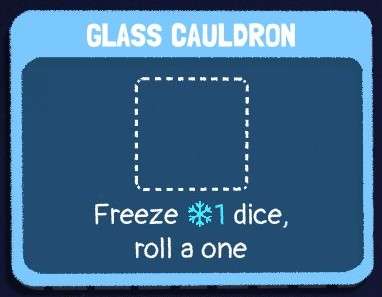
Glass Cauldron is an interesting sidegrade to the Witch’s default Cauldron. Cauldron deals 1 damage and converts a number you don’t want into another random number, which is a nice way to do some chip damage and mitigate the worst effects of RNG.
Glass Cauldron deals 0 damage, instead freezing one die and giving you a 1 every time. The die you get back is consistent (good), but a 1 is the worst number for dealing damage (bad). Also, freezing a die is higher-variance than dealing 1 damage, since 1s are worthless to some enemies, and others love having odd numbers/doubles.
Step 2: Counter Spell
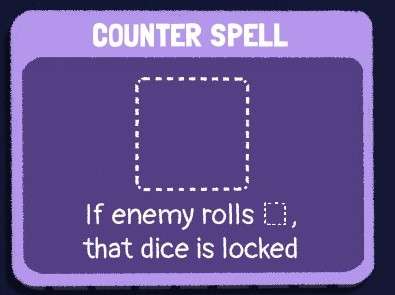
This spell is hot garbage. You spend one die, and (assuming your opponent has three dice) you have a 57.8% [(5/6)^3] chance of doing nothing. Even if you get lucky, you probably only lock one die. Sometimes you will get very lucky and lock two dice, at which point you’re maybe getting your money’s worth.
But! What if you could know ahead of time what your opponent would roll? Better yet, what if you could force your opponent to roll a certain number? You see where I’m going with this.
If you freeze a die, and then Counter Spell with a 1, you will lock the frozen die.
How the Build Works
Our eventual goal is to have two prepared spell slots and one or two upgraded slots. Glass Cauldron replaces normal Cauldron in spellbook slot 1, and Counter Spell is in any other slot. We prepare both of them.

Battle starts, you have 3 dice.
- Use a die on Glass Cauldron. You freeze a die and get back a 1.
- Use that 1 to put Glass Cauldron in the upgraded slot (making Glass Cauldron+).
- Use a die on our new Glass Cauldron+ twice. You’ve frozen three dice.
- Use that 1 to put Glass Cauldron in the last unoccupied slot.
- Use your final die on that Glass Cauldron. You’ve frozen four dice.
- Use that 1 on Counter Spell. You’ve locked four dice.
So, you’ve spent your first turn setting up, and you forced your opponent to skip their turn (no monster has more than 4 dice). Next turn:
- Use a die to Glass Cauldron four times.
- Use that 1 on Counter Spell.
- Throw two dice.
Now you’ve spent your turn to force your opponent to skip their turn, and you’ve dealt 2 damage!
You can repeat this over and over until you win.
Optimizing Damage
Spending 25 turns chipping away at Crystallina 2 damage at a time is not particularly engaging. You can optimize your damage in the following ways:
- If you have Ice Shard or Blizzard, you can replace one of your Glass Cauldrons with it. This allows you to deal more than 1 damage per die, while still freezing all of your opponent’s dice.
- If your opponent has fewer than four dice (most enemies only have three), you can replace one of your Glass Cauldrons with any damage-dealing spell.
You may run into Drake the Vampire as your final boss. Not to worry, he only has three dice, so use two slots for Glass Cauldron and Glass Cauldron+, one slot for Counter Spell, and the fourth slot for damage. Once you put him to 5 HP or less, swap your damage slot for the Wooden Stake.

Early Game
The upgraded spell slot is essential to handle four-dice enemies, so take that one first. This leaves you with only a single prepared slot in the midgame. Prepare Glass Cauldron, and rely on RNG to hand you the number you need to find Counter Spell.
Between your limit break and damage-mitigating spells like Magic Shield (and the natural damage mitigation of freezing dice), you should live long enough to randomly roll the number you need. Number-manipulation spells like Nudge will also help you find Counter Spell faster.
And that’s all! Not every run finds both Glass Cauldron and Counter Spell, so it’s not like this build will have a 100% winrate. But hopefully just knowing about the build will give you a chance to beat this elimination round.


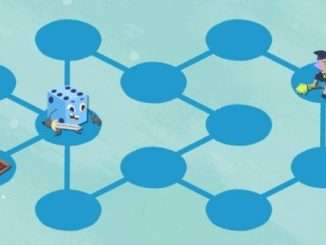
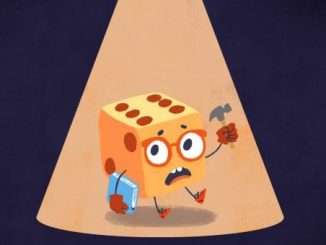
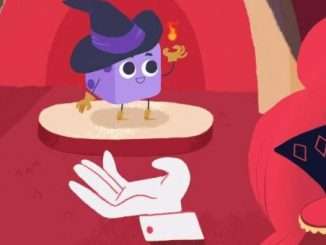
Be the first to comment